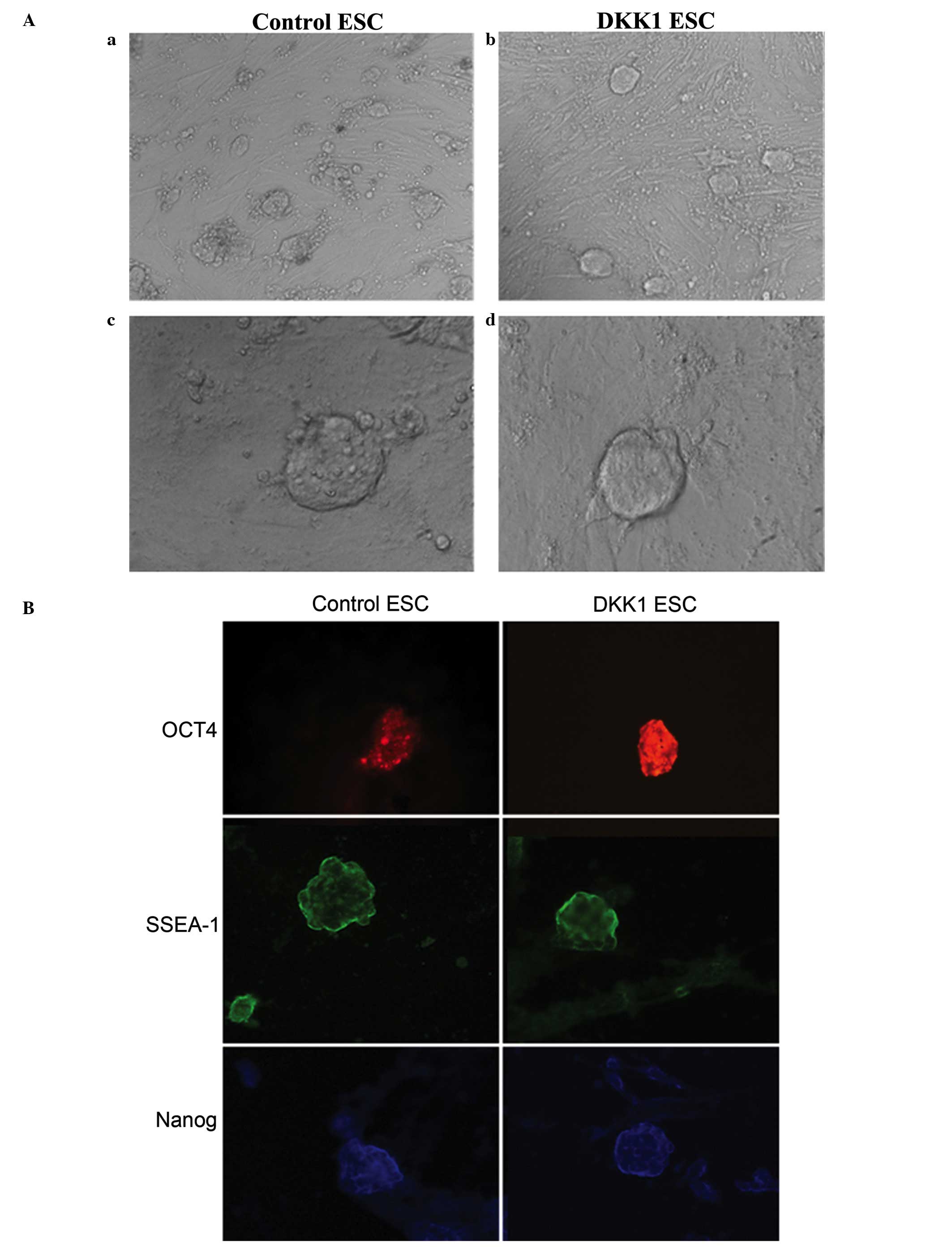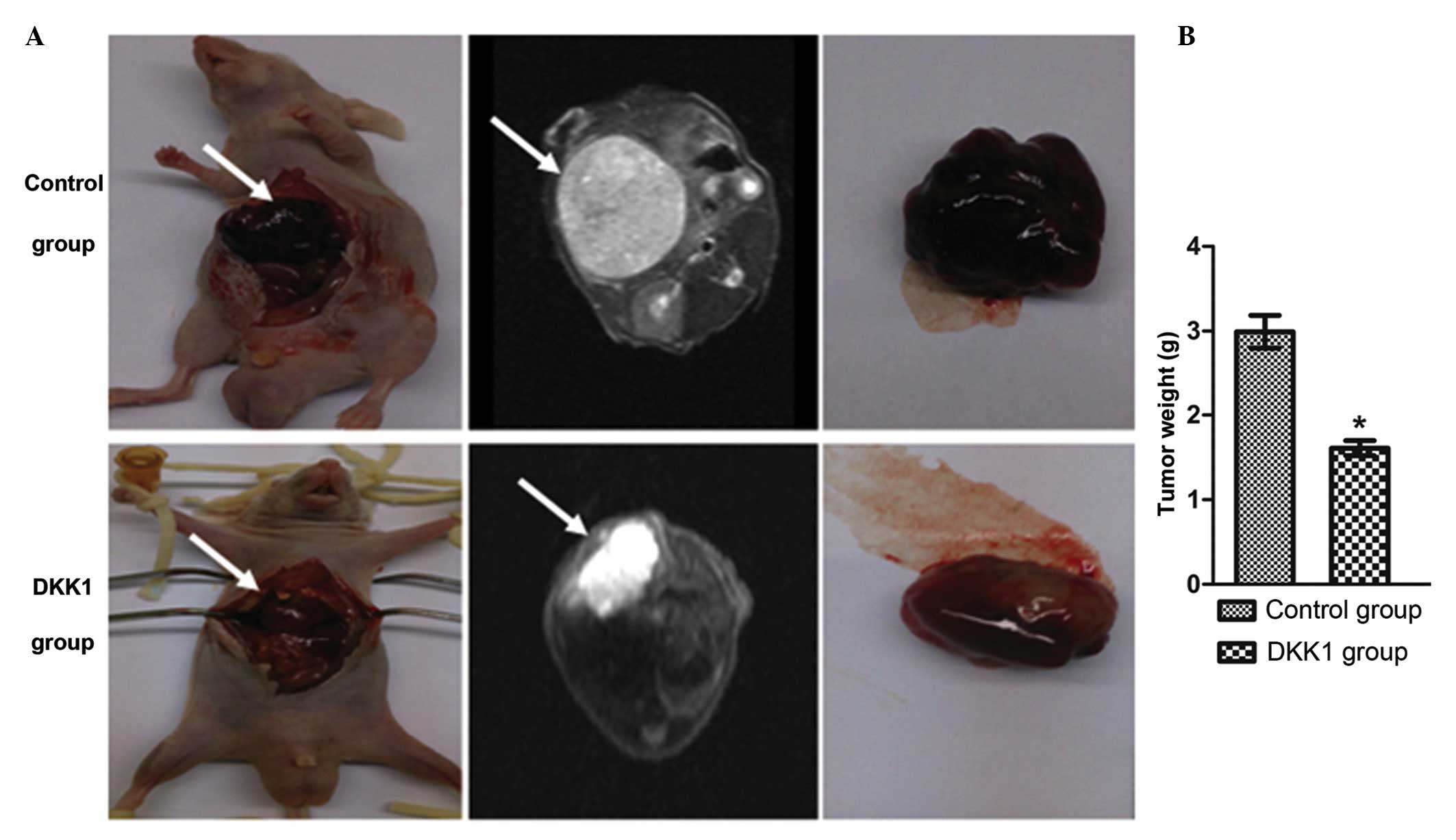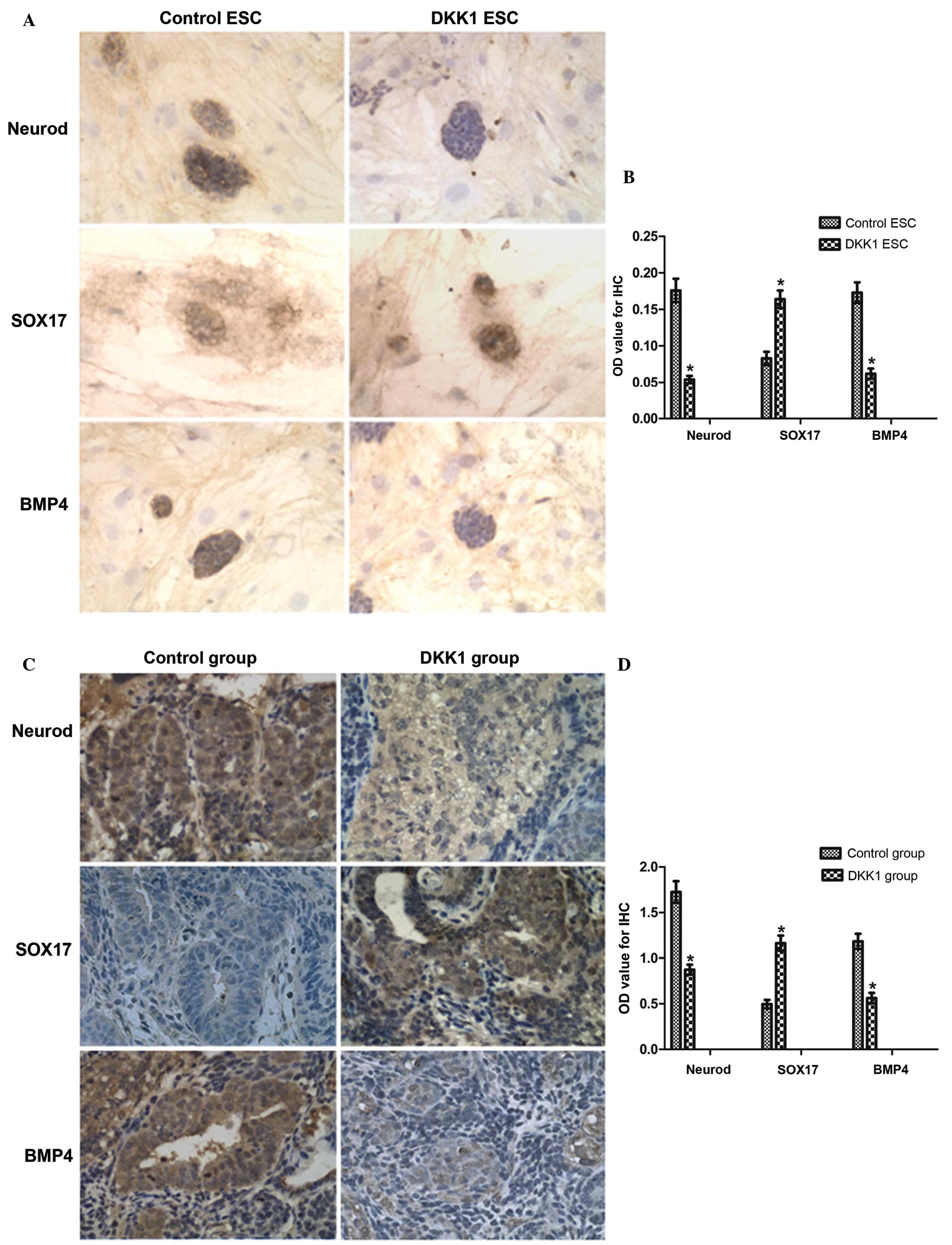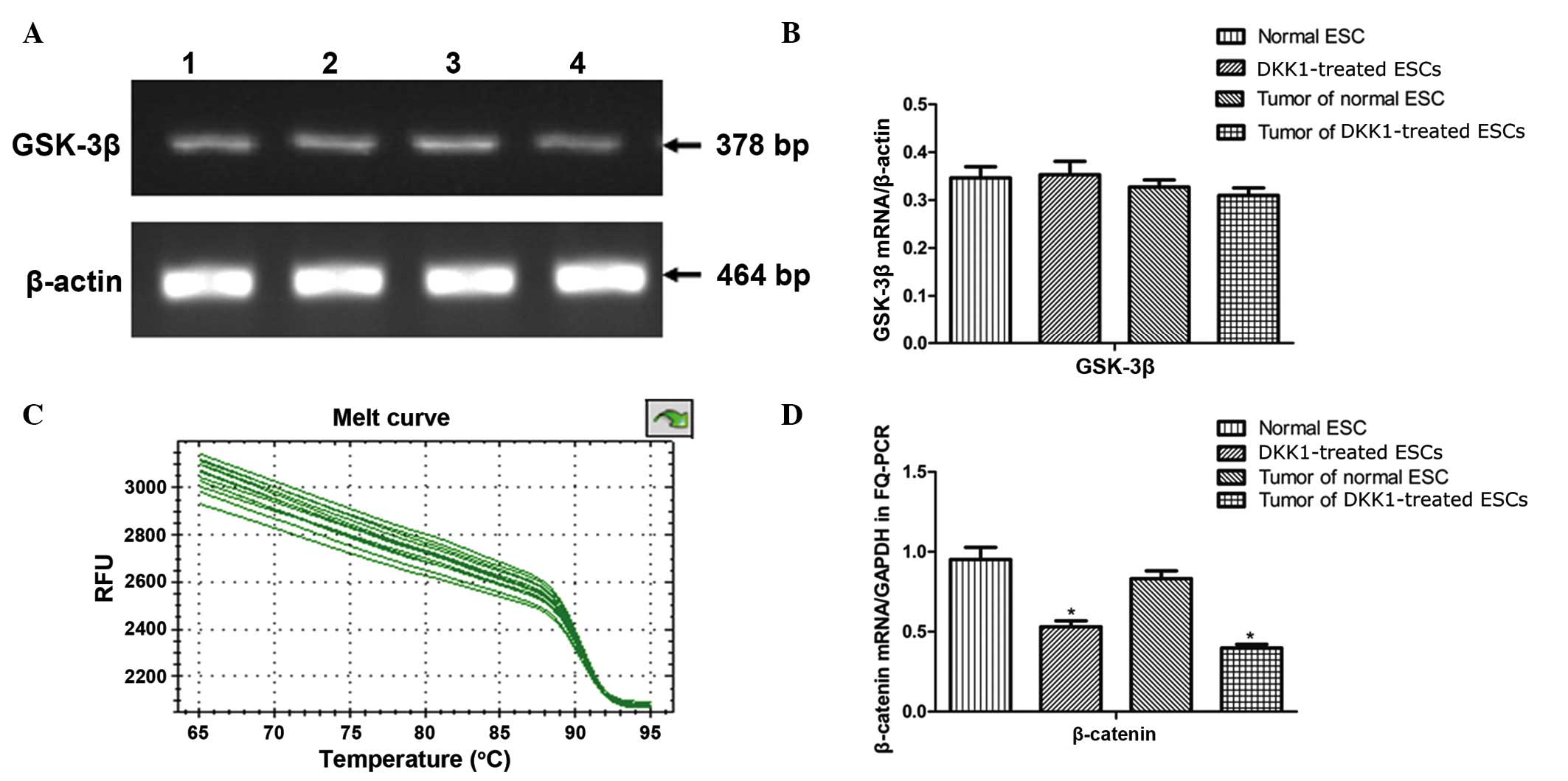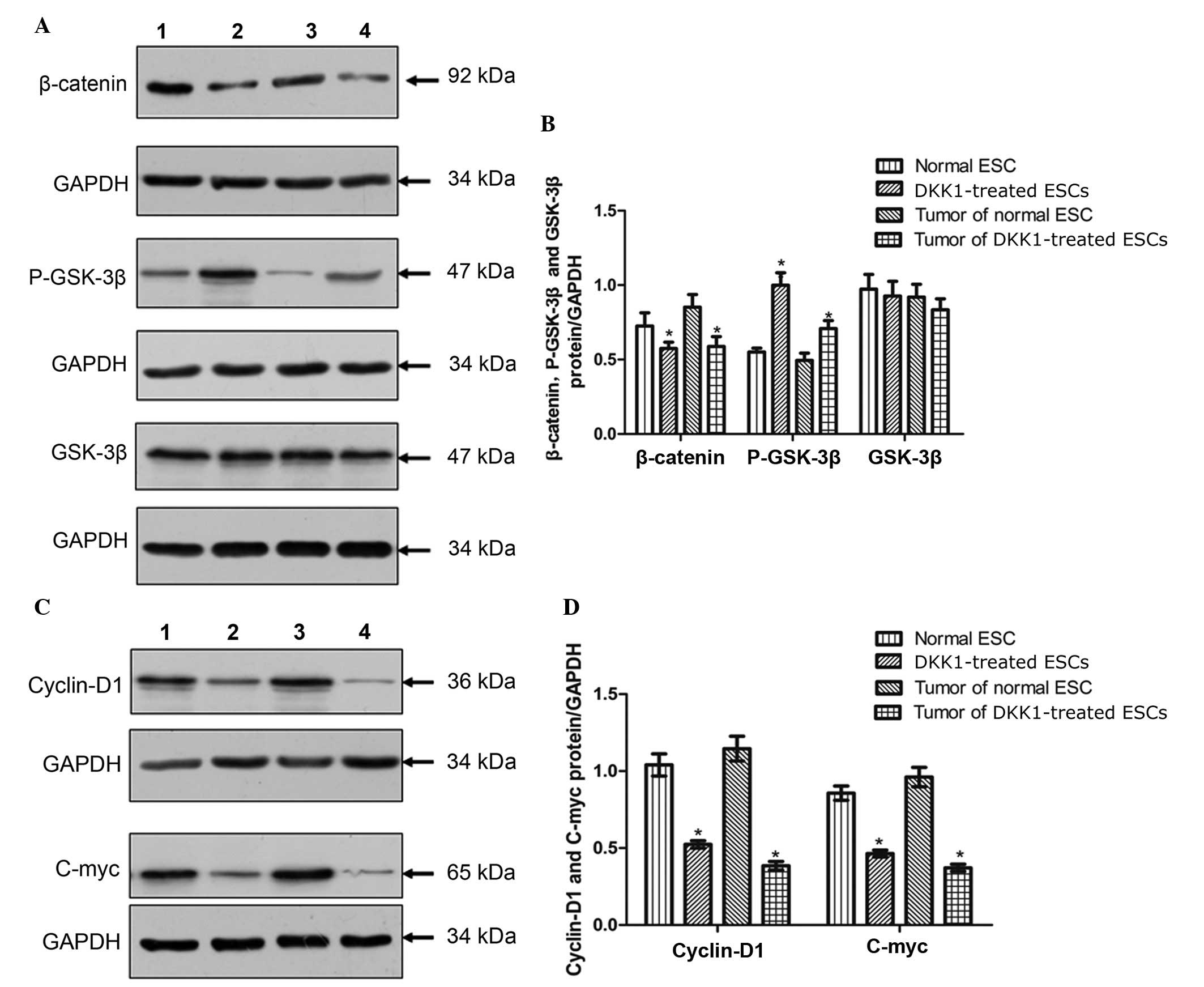|
1
|
Doetschman TC, Eistetter H, Katz M,
Schmidt W and Kemler R: The in vitro development of
blastocyst-derived embryonic stem cell lines: Formation of visceral
yolk sac, blood islands and myocardium. J Embryol Exp Morphol.
87:27–45. 1985.PubMed/NCBI
|
|
2
|
Keller G: Embryonic stem cell
differentiation: Emergence of a new era in biology and medicine.
Genes Dev. 19:1129–1155. 2005. View Article : Google Scholar : PubMed/NCBI
|
|
3
|
Davidson KC, Adams AM, Goodson JM,
McDonald CE, Potter JC, Berndt JD, Biechele TL, Taylor RJ and Moon
RT: Wnt/β-catenin signaling promotes differentiation, not
self-renewal, of human embryonic stem cells and is repressed by
Oct4. Proc Natl Acad Sci USA. 109:4485–4490. 2012. View Article : Google Scholar
|
|
4
|
Karim R, Tse G, Putti T, Scolyer R and Lee
S: The significance of the Wnt pathway in the pathology of human
cancers. Pathology. 36:120–128. 2004. View Article : Google Scholar : PubMed/NCBI
|
|
5
|
Moon RT, Kohn AD, De Ferrari GV and Kaykas
A: WNT and β-catenin signalling: Diseases and therapies. Nat Rev
Genet. 5:691–701. 2004. View
Article : Google Scholar : PubMed/NCBI
|
|
6
|
Daniels DL and Weis WI: β-catenin directly
displaces Groucho/TLE repressors from Tcf/Lef in Wnt-mediated
transcription activation. Nat Struct Mol Biol. 12:364–371. 2005.
View Article : Google Scholar : PubMed/NCBI
|
|
7
|
Huang H and He X: Wnt/β-catenin signaling:
New (and old) players and new insights. Curr Opin Cell Biol.
20:119–125. 2008. View Article : Google Scholar : PubMed/NCBI
|
|
8
|
MacDonald BT, Tamai K and He X:
Wnt/β-catenin signaling: Components, mechanisms, and diseases. Dev
Cell. 17:9–26. 2009. View Article : Google Scholar : PubMed/NCBI
|
|
9
|
van Amerongen R and Nusse R: Towards an
integrated view of Wnt signaling in development. Development.
136:3205–3214. 2009. View Article : Google Scholar : PubMed/NCBI
|
|
10
|
Gadue P, Huber TL, Paddison PJ and Keller
GM: Wnt and TGF-beta signaling are required for the induction of an
in vitro model of primitive streak formation using embryonic stem
cells. Proc Natl Acad Sci USA. 103:16806–16811. 2006. View Article : Google Scholar : PubMed/NCBI
|
|
11
|
Nakamura T, Sano M, Songyang Z and
Schneider MD: A Wnt- and beta -catenin-dependent pathway for
mammalian cardiac myogenesis. Proc Natl Acad Sci USA.
100:5834–5839. 2003. View Article : Google Scholar : PubMed/NCBI
|
|
12
|
Monzen K, Shiojima I, Hiroi Y, Kudoh S,
Oka T, Takimoto E, Hayashi D, Hosoda T, Habara-Ohkubo A, Nakaoka T,
et al: Bone morphogenetic proteins induce cardiomyocyte
differentiation through the mitogen-activated protein kinase kinase
kinase TAK1 and cardiac transcription factors Csx/Nkx-2.5 and
GATA-4. Mol Cell Biol. 19:7096–7105. 1999. View Article : Google Scholar : PubMed/NCBI
|
|
13
|
Naito AT, Akazawa H, Takano H, Minamino T,
Nagai T, Aburatani H and Komuro I: Phosphatidylinositol
3-kinase-Akt pathway plays a critical role in early
cardiomyogenesis by regulating canonical Wnt signaling. Circ Res.
97:144–151. 2005. View Article : Google Scholar : PubMed/NCBI
|
|
14
|
Peng CF, Wei Y, Levsky JM, McDonald TV,
Childs G and Kitsis RN: Microarray analysis of global changes in
gene expression during cardiac myocyte differentiation. Physiol
Genomics. 9:145–155. 2002. View Article : Google Scholar : PubMed/NCBI
|
|
15
|
Alexander J and Stainier DY: A molecular
pathway leading to endoderm formation in zebrafish. Curr Biol.
9:1147–1157. 1999. View Article : Google Scholar : PubMed/NCBI
|
|
16
|
Sinner D, Rankin S, Lee M and Zorn AM:
Sox17 and beta-catenin cooperate to regulate the transcription of
endodermal genes. Development. 131:3069–3080. 2004. View Article : Google Scholar : PubMed/NCBI
|
|
17
|
Yasunaga M, Tada S, Torikai-Nishikawa S,
Nakano Y, Okada M, Jakt LM and Nishikawa S, Chiba T, Era T and
Nishikawa S: Induction and monitoring of definitive and visceral
endoderm differentiation of mouse ES cells. Nat Biotechnol.
23:1542–1550. 2005. View
Article : Google Scholar : PubMed/NCBI
|
|
18
|
Kitajima S, Takagi A, Inoue T and Saga Y:
MesP1 and MesP2 are essential for the development of cardiac
mesoderm. Development. 127:3215–3226. 2000.PubMed/NCBI
|
|
19
|
Semënov MV, Tamai K, Brott BK, Kühl M,
Sokol S and He X: Head inducer Dickkopf-1 is a ligand for Wnt
coreceptor LRP6. Curr Biol. 11:951–961. 2001. View Article : Google Scholar : PubMed/NCBI
|
|
20
|
Sato N, Meijer L, Skaltsounis L, Greengard
P and Brivanlou AH: Maintenance of pluripotency in human and mouse
embryonic stem cells through activation of Wnt signaling by a
pharmacological GSK-3-specific inhibitor. Nat Med. 10:55–63. 2004.
View Article : Google Scholar : PubMed/NCBI
|
|
21
|
von Both I, Silvestri C, Erdemir T,
Lickert H, Walls JR, Henkelman RM, Rossant J, Harvey RP, Attisano L
and Wrana JL: Foxh1 is essential for development of the anterior
heart field. Dev Cell. 7:331–345. 2004. View Article : Google Scholar : PubMed/NCBI
|
|
22
|
Ng ES, Azzola L, Sourris K, Robb L,
Stanley EG and Elefanty AG: The primitive streak gene Mixl1 is
required for efficient haematopoiesis and BMP4-induced ventral
mesoderm patterning in differentiating ES cells. Development.
132:873–884. 2005. View Article : Google Scholar : PubMed/NCBI
|
|
23
|
Okumura N, Akutsu H, Sugawara T, Miura T,
Takezawa Y, Hosoda A, Yoshida K, Ichida JK, Yamada M, Hamatani T,
et al: β-catenin functions pleiotropically in differentiation and
tumorigenesis in mouse embryo-derived stem cells. PLoS One.
8:e632652013. View Article : Google Scholar
|
|
24
|
Gubbay J, Collignon J, Koopman P, Capel B,
Economou A, Münsterberg A, Vivian N, Goodfellow P and Lovell-Badge
R: A gene mapping to the sex-determining region of the mouse Y
chromosome is a member of a novel family of embryonically expressed
genes. Nature. 346:245–250. 1990. View
Article : Google Scholar : PubMed/NCBI
|
|
25
|
Marson A, Foreman R, Chevalier B, Bilodeau
S, Kahn M, Young RA and Jaenisch R: Wnt signaling promotes
reprogramming of somatic cells to pluripotency. Cell Stem Cell.
3:132–135. 2008. View Article : Google Scholar : PubMed/NCBI
|
|
26
|
Lluis F, Pedone E, Pepe S and Cosma MP:
Periodic activation of Wnt/beta-catenin signaling enhances somatic
cell reprogramming mediated by cell fusion. Cell Stem Cell.
3:493–507. 2008. View Article : Google Scholar : PubMed/NCBI
|
|
27
|
Bone HK, Nelson AS, Goldring CE, Tosh D
and Welham MJ: A novel chemically directed route for the generation
of definitive endoderm from human embryonic stem cells based on
inhibition of GSK-3. J Cell Sci. 124:1992–2000. 2011. View Article : Google Scholar : PubMed/NCBI
|
|
28
|
Nakanishi M, Kurisaki A, Hayashi Y,
Warashina M, Ishiura S, Kusuda-Furue M and Asashima M: Directed
induction of anterior and posterior primitive streak by Wnt from
embryonic stem cells cultured in a chemically defined serum-free
medium. FASEB J. 23:114–122. 2009. View Article : Google Scholar
|
|
29
|
Lin SY, Xia W, Wang JC, Kwong KY, Spohn B,
Wen Y, Pestell RG and Hung MC: Beta-catenin, a novel prognostic
marker for breast cancer: Its roles in cyclin D1 expression and
cancer progression. Proc Natl Acad Sci USA. 97:4262–4266. 2000.
View Article : Google Scholar : PubMed/NCBI
|















